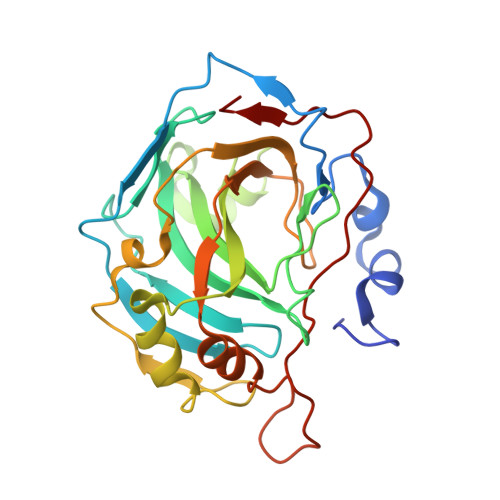Structural influence of hydrophobic core residues on metal binding and specificity in carbonic anhydrase II.
Cox, J.D., Hunt, J.A., Compher, K.M., Fierke, C.A., Christianson, D.W.(2000) Biochemistry 39: 13687-13694
- PubMed: 11076507
- DOI: https://doi.org/10.1021/bi001649j
- Primary Citation of Related Structures:
1FQL, 1FQM, 1FQN, 1FQR, 1FR4, 1FR7, 1FSN, 1FSQ, 1FSR - PubMed Abstract:
Aromatic residues in the hydrophobic core of human carbonic anhydrase II (CAII) influence metal ion binding in the active site. Residues F93, F95, and W97 are contained in a beta-strand that also contains two zinc ligands, H94 and H96. The aromatic amino acids contribute to the high zinc affinity and slow zinc dissociation rate constant of CAII [Hunt, J. A., and Fierke, C. A. (1997) J. Biol. Chem. 272, 20364-20372]. Substitution of these aromatic amino acids with smaller side chains enhances Cu(2+) affinity while decreasing Co(2+) and Zn(2+) affinity [Hunt, J. A., Mahiuddin, A., & Fierke, C. A. (1999) Biochemistry 38, 9054-9062]. Here, X-ray crystal structures of zinc-bound F93I/F95M/W97V and F93S/F95L/W97M CAIIs reveal the introduction of new cavities in the hydrophobic core, compensatory movements of surrounding side chains, and the incorporation of buried water molecules; nevertheless, the enzyme maintains tetrahedral zinc coordination geometry. However, a conformational change of direct metal ligand H94 as well as indirect (i.e., "second-shell") ligand Q92 accompanies metal release in both F93I/F95M/W97V and F93S/F95L/W97M CAIIs, thereby eliminating preorientation of the histidine ligands with tetrahedral geometry in the apoenzyme. Only one cobalt-bound variant, F93I/F95M/W97V CAII, maintains tetrahedral metal coordination geometry; F93S/F95L/W97M CAII binds Co(2+) with trigonal bipyramidal coordination geometry due to the addition of azide anion to the metal coordination polyhedron. The copper-bound variants exhibit either square pyramidal or trigonal bipyramidal metal coordination geometry due to the addition of a second solvent molecule to the metal coordination polyhedron. The key finding of this work is that aromatic core residues serve as anchors that help to preorient direct and second-shell ligands to optimize zinc binding geometry and destabilize alternative geometries. These geometrical constraints are likely a main determinant of the enhanced zinc/copper specificity of CAII as compared to small molecule chelators.
- Roy and Diana Vagelos Laboratories, Department of Chemistry, University of Pennsylvania, Philadelphia, Pennsylvania 19104-6323, USA.
Organizational Affiliation:


















